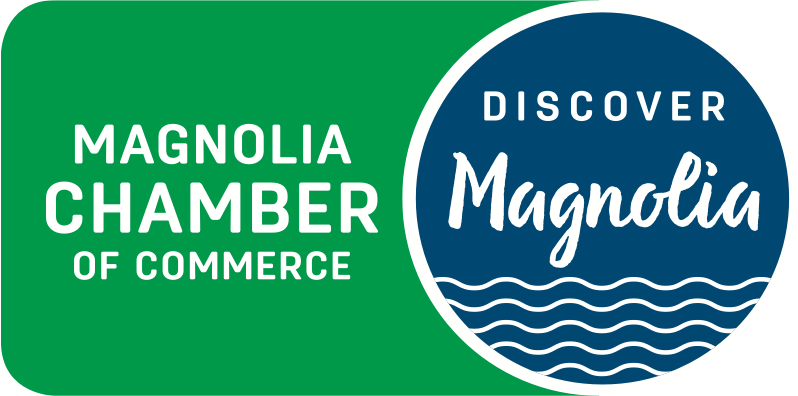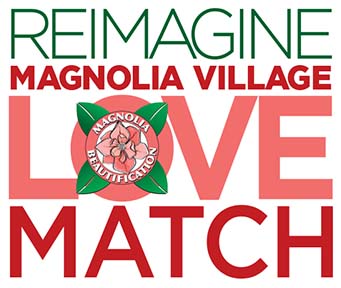These unprecedented times have been challenging to all of our Magnolia Chamber of Commerce members. However, we’re immensely proud of our members for helping our community succeed, from staying in business during this tough time, to shopping local, to donating meals to essential employees, to sewing masks, to creatively doing business online and using social media to share your latest information. Because of you, we will truly #KeepMagnoliaMighty.
We are your partner.
We know that as member businesses start to ready themselves for re-opening or further modifing business operations, you will need plenty of PPE, sanitizer, etc.
But we want to learn more.
We are cordially asking you to participate in another Magnolia Chamber survey, which we will launch early next week, May 11-15. Our last survey was shared with our local elected federal, state, county and city officials. We are dialoguing with our elected officials on a regular basis right now. We want to hear from you again so we can share how public health and economic policies are affecting you, our Magnolia business community.
We want to learn more about your re-opening plans in response to Governor Jay Inslee’s “Safe Start Washington” efforts. We will be asking you questions regarding your business operations, how will you be accessing the PPE and sanitizing resources you need, what are your concerns with safety guidelines, and seeking updates on how you have been impacted over the last month. We will then use this information to be your unabashed advocate in ensuring policies are being responsive to your experiences in running a business during the COVID-19 pandemic.
We know many of you are anxious to reopen your doors per the requirements set by the state’s “Safe Start Washington” plan – a four phased approach to reopening Washington’s economy. To ensure the safety of Magnolians and to help you navigate the new normal, we are sharing tips to assist in keeping you, your employees, your customers, and the general public safe. We are including recommendations and guidelines that have been developed by the CDC and other federal, state, and local agencies. This resource will be updated as this fluid situation changes, and we receive other publicly available guidance from local, state, and federal government.
Though we all wish to return to our regular lives, we must be prudent and take the necessary precautions during this time. The publicly available guidance provided below is consistent with the Governor’s phased in approach to ensure enough incubation time between phases plus the. time to compile disease data and monitor trends. Sadly, the virus is still in the Seattle area and we still have new cases every day. The guidelines are curated to help you safely serve your customers and accommodate your employees as the state re-opens using the Governor’s plan of action.
Thank you for your support as we all. continue to navigate through this pandemic. We’ll continue to persevere because we are better together.
GENERAL RECOMMENDATIONS TO PROTECT EMPLOYEES & CUSTOMERS Employee + Customer Protection = Work Hard, Work Smart, Work Safe
Employ Personal Protective Equipment – PPE:
Employ Social Distancing:
-
Practice sensible social distancing, maintaining six feet between co-workers.
-
All persons in the store will be required to maintain a social distance of at least six feet between each other. Sales registers should be at least six feet apart.
-
The number of people inside the store will be limited to 50% of fire marshal capacity or 8 people per 1,000 square feet.
-
When possible, open all non-essential doors to reduce the need for direct contact.
-
Stores with higher traffic will mark spaces 6 feet apart at the sales registers and outside the entrance to the store.
Manage Health of Employees:
-
Employees who have a fever or are otherwise exhibiting COVID-19 symptoms should not be allowed to work.
-
A sign should be posted on the store that individuals who have a fever, cough or any sign of sickness should not enter.
-
Employees should avoid touching your eyes, nose and mouth – Do NOT shake hands.
-
Employees should be required to take reasonable steps to comply with guidelines on sanitation from the Center for Disease Control and Prevention and the Washington Department of Health.
-
Encourage workers to report any safety and health concerns to you, the employer.
Provide Sanitary Conditions:
-
Provide a place to wash hands or alcohol-based hand rubs containing at least 60% alcohol.
-
Train workers in proper hygiene practices.
-
Sanitize any high-traffic areas, such as doorknobs, counters, etc.
-
Customers should be required to use hand sanitizer upon entering the store.
Conduct Smart/Safe Monetary Transactions:
-
Limit cash handling.
-
Encourage customers to use credit/debit cards, tap to pay, Venmo, PayPal or another form of contact-less payment.
-
Sanitize point of sale equipment after each use, including pens.
-
Provide hand sanitizer and disinfectant wipes at register locations.
We are better together.
We will #KeepMagnoliaMighty and be your advocate in the weeks ahead. Thank you in advance for participating in next week’s Magnolia business climate survey. We have received appreciation from our elected leaders because we are sharing data and helpful information about you – our members. Your experiences, impacts, and needs must be shared with policy makers. It will help shape plans and programs moving forward.
Kroger, Inc. offers publicly available BluePrint for Businesses resources, guidance, best practices.
Earlier this week, Kroger, Inc. has posted a blue print for businesses based on what they have learned about operating in response to the COVID-19. Kroger wants to share their experiences and best practices with other businesses, so you can take steps now to develop protocols and procedures to reopen safely and continue to flatten the curve. Sharing What We’ve Learned: A Blueprint for Businesses is reportedly the first installment of timely, proven-effective information that includes recommendations, insights, best practices and downloadable creative assets to help businesses navigate the next phase of this unprecedented pandemic.
Kroger will continue to update the Blueprint in the coming days and weeks, providing additional resources, tools and templates for other industries to leverage. We will be posting on this website as the blueprint has received high praise from public health officials in its effectiveness. Kudos to Kroger for sharing best practices during this critical phase in the pandemic response.
Citywide Survey. Please participate. Gaining insights essential in weeks ahead.
The City of Seattle Office of Economic Development, Greater Seattle Partners, and the Seattle Metropolitan Chamber of Commerce today released the second round of the COVID-19 Business Impact Survey. The first round of the survey was open March 18 – 31 and saw over 5,000 total respondents—over 2,000 of which were businesses in Seattle.
The first round of the survey established baseline profile data of the businesses, nonprofits and independent workers in the Seattle region, captured the initial impact COVID-19 had on businesses, nonprofits, and independent workers in King, Pierce, and Snohomish counties, and documented real-time concerns people had in an evolving environment.
Round two of the survey will build upon the initial survey questions to measure potential changes over time, seek to further understand operational changes business have implemented since the beginning of the COVID-19 pandemic, and evaluate the impact private and public funding have had on businesses’ ability to stay afloat.

